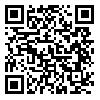Volume 11, Issue 1 (Spring 2025)
J Health Res Commun 2025, 11(1): 74-87 |
Back to browse issues page
Download citation:
BibTeX | RIS | EndNote | Medlars | ProCite | Reference Manager | RefWorks
Send citation to:



BibTeX | RIS | EndNote | Medlars | ProCite | Reference Manager | RefWorks
Send citation to:
Beheshti Motlagh A, Basharpoor S. Structural Relationship Analysis of Substance Use Tendencies in Adolescents: The Role of Childhood Maltreatment, Parenting Styles, and the Mediating Role of Impulsivity. J Health Res Commun 2025; 11 (1) :74-87
URL: http://jhc.mazums.ac.ir/article-1-1089-en.html
URL: http://jhc.mazums.ac.ir/article-1-1089-en.html
Professor, Department of Psychology, Faculty of Educational Sciences and Psychology, University of Mohaghegh Ardabili, Ardabil, Iran
Abstract: (882 Views)
Introduction and purpose: The tendency to use drugs in adolescents has become an important issue at the individual-social level, and an addicted person imposes enormous costs on the family, as well as the education and health systems. Therefore, this study aimed to investigate the structural relationships between the tendency to use drugs based on childhood maltreatment and parenting styles with the mediating role of impulsivity in adolescents.
Methods: This correlational study was conducted based on structural equation modeling. The statistical population included students studying in junior and senior high schools in the academic year 1401-02. In total, 210 students were selected using the cluster sampling method. Data were collected utilizing Fidel's Childhood Maltreatment Questionnaire (1989), Baumrind's Parenting Styles Questionnaire (1973), Barrett's Impulsivity Questionnaire (1995), and Farjad's Substance Use Propensity Questionnaire (2006). The data were analyzed using Pearson's correlation test and structural equation modeling in SPSS software (version 25) and Lisrel software (version 8.8).
Results: The results showed that the direct effect of childhood maltreatment variables (B=0.36; P<0.01), permissive parenting style (B=0.17; P<0.01), and authoritarian parenting style (B=0.14; P<0.01) on the tendency to use drugs and impulsivity is positive and significant, and the direct effect of authoritative parenting style (B=-0.13; P<0.01) on the tendency to use drugs and impulsivity is negative and significant. Moreover, the impulsivity variable (B=0.26; P<0.01) also had a positive and significant effect on the tendency to use drugs. The goodness of fit index was 0.87 and the root mean square error index was 0.045.
Conclusion: Maltreatment, as well as permissive and authoritarian parenting styles along with impulsivity, can create a tendency to use drugs in an individual. Parents' attention to using an appropriate parenting style and identifying impulsive traits in adolescents can prevent a tendency to use drugs in adolescents.
Methods: This correlational study was conducted based on structural equation modeling. The statistical population included students studying in junior and senior high schools in the academic year 1401-02. In total, 210 students were selected using the cluster sampling method. Data were collected utilizing Fidel's Childhood Maltreatment Questionnaire (1989), Baumrind's Parenting Styles Questionnaire (1973), Barrett's Impulsivity Questionnaire (1995), and Farjad's Substance Use Propensity Questionnaire (2006). The data were analyzed using Pearson's correlation test and structural equation modeling in SPSS software (version 25) and Lisrel software (version 8.8).
Results: The results showed that the direct effect of childhood maltreatment variables (B=0.36; P<0.01), permissive parenting style (B=0.17; P<0.01), and authoritarian parenting style (B=0.14; P<0.01) on the tendency to use drugs and impulsivity is positive and significant, and the direct effect of authoritative parenting style (B=-0.13; P<0.01) on the tendency to use drugs and impulsivity is negative and significant. Moreover, the impulsivity variable (B=0.26; P<0.01) also had a positive and significant effect on the tendency to use drugs. The goodness of fit index was 0.87 and the root mean square error index was 0.045.
Conclusion: Maltreatment, as well as permissive and authoritarian parenting styles along with impulsivity, can create a tendency to use drugs in an individual. Parents' attention to using an appropriate parenting style and identifying impulsive traits in adolescents can prevent a tendency to use drugs in adolescents.
Type of Study: Research(Original) |
Subject:
Psychology
Send email to the article author
| Rights and permissions | |
 |
This work is licensed under a Creative Commons Attribution-NonCommercial 4.0 International License. |







